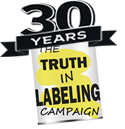LABEL LIES
Basic Facts (things the "glutes" don't want you to know)
This is How the "MSG is Safe" Game is Played
Propaganda
 Propaganda. More powerful than research.
Propaganda. More powerful than research.
“Propaganda is information that is not objective and is used primarily to influence an audience and further an agenda, often by presenting facts selectively to encourage a particular synthesis or perception, or using loaded language to produce an emotional rather than a rational response to the information that is presented.[1] Propaganda is often associated with material prepared by governments, but activist groups, companies, religious organizations and the media can also produce propaganda” (2).Glutamate-industry propaganda is based on industry’s Six Big Fat Lies; on extensive repetition of praise for monosodium glutamate; on disparagement of people who question the safety of monosodium glutamate – all bound up in beautifully wrapped consumer-friendly rhetoric.
The “facts” found in glutamate-industry propaganda come from their Six Big Fat Lies. Use of a particular lie depends on the point that industry is attempting to make, and the audience it’s addressing:
1) The glutamate contained in MSG is identical to the glutamate in the human body.“Loaded language” used in glutamate-industry propaganda is of two kinds: Language that encourages the reader or listener to think kindly of monosodium glutamate, and Language that puts down or disparages people, institutions or others that raise doubts about the safety of monosodium glutamate.2) MSG is very well researched and found to be safe.
3) It must be safe since the FDA has said so.
4) MSG has been used for over a century without adverse reactions.
5) MSG is naturally made, similar to yogurt, vinegar and wine.
6) Monosodium glutamate occurs naturally in food.
Prohibited? Anything that might suggest that monosodium glutamate might be toxic is Prohibited. This is accomplished, in part, by ignoring anything that might cast a shadow on the safety of monosodium glutamate.
Industry propaganda that claims that monosodium glutamate is a harmless, or even beneficial food additive, is designed to appeal to consumers’ vision of the good things in life. Making no distinction between fact and fiction, industry propaganda is designed to appeal to consumers’ visions of the good things in life.
The glutamic acid in monosodium glutamate is a life-giving building block of protein, essential to healthy body function.More powerful than facts/lies and loaded language is the way that lies and loaded language are packaged – and the way in which propaganda praising the benefits of monosodium glutamate appeals to your vision of the good things in life.Things that occur naturally in nature are good. Monosodium glutamate is naturally occurring. Nature is the source of good health, and monosodium glutamate is naturally occurring.
Science, scientific research, is the gold standard against which “truth” must be evaluated. “Truth” is revealed by science. Scientific studies will lead us to “truths.” Science is good. The glutamate industry uses science.
Rarely will anything negative be said about monosodium glutamate. The closest to a negative inference will be a statement to the effect that “some stupid people have said that they think there’s a problem with MSG.” On the other hand, no matter what the ostensible subject of a given piece might be, glutamate-industry writing overflows with reference to monosodium glutamate safety studies and praise for the virtues of consuming it. Often research reports on the safety of monosodium glutamate begin with praise for the virtues of umami – which will have no relevance at all to the research being reported. Glutamate industry goals are to brainwash readers with positive thoughts about using monosodium glutamate and to have readers feel guilty for thinking otherwise.
A December 2018 article by John Fernstrom, “Monosodium Glutamate in the Diet Does Not Raise Brain Glutamate Concentrations or Disrupt Bain Functions, reads, in part, “Its pleasant taste (as MSG), has led to its inclusion as a flavoring agent in foods for centuries” – a fact (if it is a fact) which has no relevance to the subject of the paper (3).
A May, 2016 article, “Does monosodium glutamate really cause headache? a systematic review of human studies,” by Yoko Obayashi and Yoichi Nagamura states that “The safety of glutamic acid and its salts as flavor enhancers was evaluated by the Joint FAO/WHO Expert Committee on Food Additives in 1971 [2], 1974 [3], and 1987 [4] and it allocated an “acceptable daily intake (ADI) not specified” based on the conclusion that the total intake of glutamate arising from their use at levels necessary to achieve the desired technological effect and from their acceptable background in food do not represent a hazard to health” (6).
While actions of these authoritative bodies may be of interest, they have no relevance to the subject of headache.
Prohibition against mention of anything that might suggest that monosodium glutamate might be toxic is illustrated in a March 22, 1991 letter from IGTC Chairman Andrew Ebert, to FASEB, written in responded to an inquiry asking Ebert to elaborate on the vehicle for administration of placebos used in IGTC’s double blind studies. In that letter Ebert made no mention of the fact that the question that had been raised pertained to the appropriateness of the placebos used in the IGTC’s double-blind studies (4). In this same letter, Ebert waxes eloquent about the value of adding aspartic acid to the beverage mix -- the beverage mix we now know contains the excitotoxic aspartic acid found in aspartame:
The beverage mix has been used for years for a good cause: to mask the taste of MSG.But no mention is made of the fact that the placebos used were laced with aspartame, and that aspartame-laced placebos are not placebos at all, but are toxic compounds that will produce the same reactions as are produced by monosodium glutamate.The beverage mix was modified for good reason – to assure ingestion of glutamate in a low carbohydrate medium.
Ebert also uses language that puts down or disparages people:
Reports of reactions to monosodium glutamate are “complaints,” “anecdotal,” and “so voluminous as to make one doubt the veracity of the remarks.”At the same time, Ebert reminds the reader that he is a professional: “As a toxicologist…” – Ebert presents himself as an expert.
And Ebert lies. “I know of nothing in nature that has such a comprehensive series of effects,” says Ebert about the myriad of reactions said to be caused by monosodium glutamate. But Ebert the toxicologist must know that neurotrophic (neurological) drugs have the same comprehensive series of “effects” (“side effects”) as are recorded as reactions to monosodium glutamate. No surprise about glutamate-induced “side effects,” because glutamic acid (glutamate) is used in pharmaceuticals where it is acknowledged to be a drug.
Ebert also reinforces the industry-based lie that the reactions to monosodium are limited to those three or four reactions described by Schaumburg in 1968-69. The dozens of adverse reactions to monosodium glutamate identified by others are not mentioned.
Finally, proof of the safety of monosodium glutamate is offered: “It is now possible to say with confidence that with concentrations of MSG of the order of .75 percent, it is extremely unlikely that any of the symptoms will be experienced by even a demonstrably sensitive individual.”
What Ebert means by “concentrations of MSG of the order of .75 per cent” is unclear. And the statement that “MSG is not frequently used at concentrations above that,” would suggest to the reader that there is very little MSG used in processed food. In 1992, the date of Ebert’s letter to Anderson, that was a straight-out lie.
In his letter to Anderson, Ebert acknowledged that since 1978, all of the placebos in double blind IGTC-sponsored studies had been laced with aspartame – (an ingredient which is known to produce the exact same reactions as monosodium glutamate). But that fact is buried in a heap of feel-good-about-monosodium glutamate language; and if a consumer chances to see a copy of Ebert’s letter, that consumer isn’t going to pick up on what might be thought of as a bit of scientific fraud.
Language that puts down or disparages people is often found in Internet pieces fueled by freelance journalists. Claire Lower’s “Put MSG in Everything, You Cowards” is one example. The reader can only guess what point Lower is trying to make by saying “… the symptoms of ‘Chinese Restaurant Syndrome’ have never been reproduced in a laboratory setting. (If that syndrome sounds pretty racist, that’s because it very much is.)” (5)
More often in print than on the Internet are propaganda pieces dressed up as news. The story of a famous chef; the story of a new restaurant: the story of a celebrity whose good looks depend on supplements that contain MSG – all will have good things to say about monosodium glutamate in articles dressed up as news.
Misrepresentation of fact is common to the so-called “scientific studies.” The Brosnan, Drewnowski, Friedman article, “Is there a relationship between dietary MSG and [corrected] obesity in animals or humans?” is full of them (7). The published report truly reflects the conclusions drawn in that consensus meeting. But the conclusion presented to the reader to take as fact are distortions of the truth. “The principal conclusions were:
(1) the proposed link between MSG intake and weight gain is likely explained by co-varying environmental factors (e.g., diet, physical activity) linked to the "nutrition transition" in developing Asian countries.Reviews of the literature take a different approach to adding to the stream of glutamate-industry propaganda. A review of the literature will be made up of glutamate-industry-friendly publications, with few, if any, others. The The 130 references in “Glutamate. Its applications in food and contribution to health” by S Jinap and P Hajeb provide an illustration (8).(2) Controlled intervention studies adding MSG to the diet of animals and humans show no effect on body weight. (Editorial comment: There seem to be no such studies.)
(3) Hypotheses positing dietary MSG effects on body weight involve results from rodent MSG injection studies that link MSG to actions in brain not applicable to MSG ingestion studies. The fundamental reason is that glutamate is metabolically compartmentalized in the body, and generally does not passively cross biologic membranes. Hence, almost no ingested glutamate/MSG passes from gut into blood, and essentially none transits placenta from maternal to fetal circulation, or crosses the blood-brain barrier. Dietary MSG, therefore, does not gain access to brain. Overall, it appears that normal dietary MSG use is unlikely to influence energy intake, body weight or fat metabolism." Look here, here and here for accurate information.
Ajinomoto and friends refer to their propaganda as publicity -- information, advertising, marketing. We know glutamate-industry propaganda as misinformation -- disinformation, indoctrination, party line, brain washing, and half-truths.
REFERENCES
2. https://en.wikipedia.org/wiki/Propaganda accessed 1/12/2019
3. Fernstrom JD. Monosodium Glutamate in the Diet Does Not Raise Brain Glutamate Concentrations or Disrupt Brain Functions. https://www.ncbi.nlm.nih.gov/pubmed/30508818
5. Lower, Claire “Put MSG in Everything, You Cowards” accessed /17/2019
6. Obayashi and Nagamura i. “Does monosodium glutamate really cause headache? a systematic review of human studies” https://www.ncbi.nlm.nih.gov/pmc/articles/PMC4870486/
7. Brosnan JT, Drewnowski A, Friedman MI. Is there a relationship between dietary MSG and [corrected] obesity in animals or humans? https://www.ncbi.nlm.nih.gov/pubmed/24927698
8. Jinap S, Hajeb P. Glutamate. Its applications in food and contribution to health. https://www.ncbi.nlm.nih.gov/pubmed/20470841

